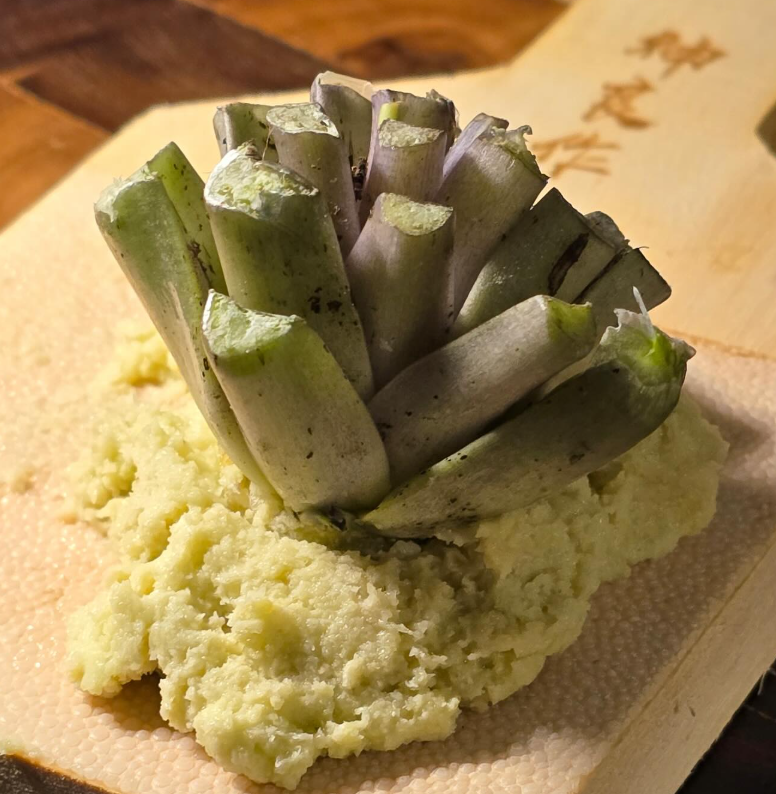Next time you order sushi, take a closer look at that dollop of green paste beside your soy sauce. Chances are, it’s not wasabi. It’s an imposter—horseradish, mustard, and food coloring masquerading as the real deal. In fact, over 95% of the “wasabi” served in sushi restaurants worldwide isn’t wasabi at all.
But Israeli agricultural entrepreneurs are looking to change that.
The Wasabi Challenge
Authentic wasabi thrives in specific conditions: cool temperatures between 8-20°C (46-68°F), high humidity, and shade, typically found in Japan's mountainous riverbeds. These stringent requirements make cultivation outside its native environment exceptionally challenging. Consequently, real wasabi can command prices around $167 per pound in markets like the United States and Israel.
Israeli Innovation in Wasabi Cultivation
Enter Ran Ronen, Israel's pioneering wasabi farmer. As reported in Israel21C, with a background in solar energy and a passion for agriculture, Ronen established Wasabi Israel six years ago in Moshav Eliad, located in Israel's north. Recognizing the plant's sensitivity and the Middle East's hot climate, where summer temperatures can soar to 40°C (104°F), Ronen adopted a "startup nation" approach. He utilized intensive agricultural methods, including climate-controlled greenhouses, to simulate the ideal growing conditions for wasabi.
After obtaining wasabi tissue cultures from Japan, Ronen began cultivating seedlings on a half-dunam plot (approximately an eighth of an acre). Despite the challenges, including launching his first harvest during the pandemic in 2020, Wasabi Israel has flourished. Today, Ronen's fresh, kosher "green gold" is featured in upscale restaurants across Israel, with plans to expand into international markets.
Image credit: https://www.instagram.com/p/DC6xwoeOm_I/
Galilee Culinary Institute by JNF: A Gastronomic Celebration of Israel's North
Israel's northern region is a tapestry of 82 diverse cultures, each contributing unique flavors and culinary traditions. The Galilee Culinary Institute by JNF (GCI by JNF) offers students and visitors an immersive experience into this rich gastronomic landscape. Participants can explore traditional bread-making techniques, delve into the intricacies of Druze cuisine, and will hopefully even learn about innovative agricultural practices like wasabi cultivation. GCI by JNF provides a comprehensive understanding of the region's culinary depth, blending time-honored traditions with modern agricultural advancements.
Spectacular dormitories and GCI by JNF
Circle of Impact
Jewish National Fund-USA is leading a bold strategy to attract 800,000 new residents to Israel’s underpopulated north and south. Through its Circle of Impact, every project, initiative, and program supports job creation, community resilience, and economic development—key drivers of population growth in these frontier regions. As part of its bold vision, Jewish National Fund-USA funds projects like GCI by JNF because of the immensely positive ripple effect the initiative will have on the region. The institute will create jobs and growth and help the area flourish.
A Flavorful Future
Through the dedication of innovators like Ronen and institutions like GCI by JNF, Israel is preserving its rich culinary heritage and pushing the boundaries of agricultural possibilities. As authentic wasabi becomes more accessible, the next time you enjoy sushi, you might just taste the real thing, cultivated with Israeli ingenuity.
For more information about GCI by JNF, visit galileeculinaryinstitute.org. To support Jewish National Fund-USA's impact in Israel's north and south, visit jnf.org/donate


